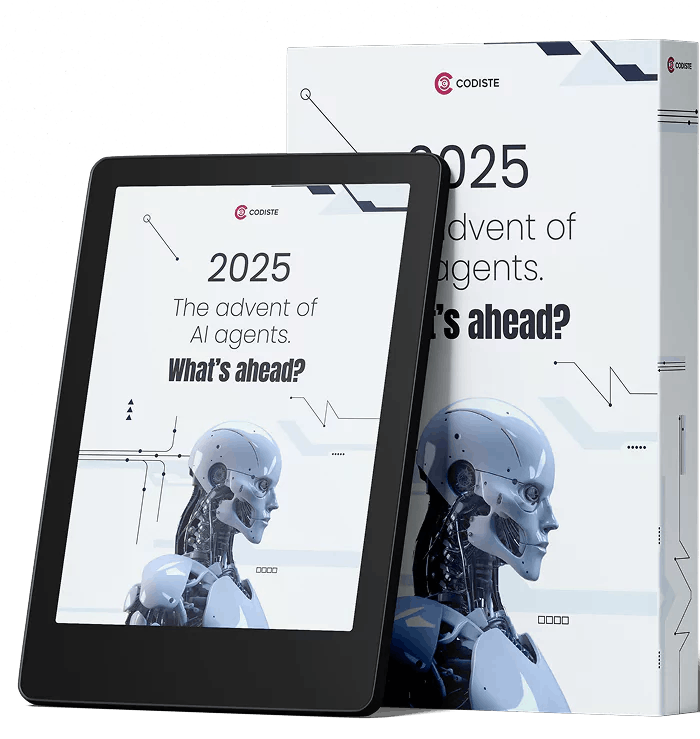
,
AI agents and Agentic workflows are to be considered as the revolution in Artificial Intelligence instead of just as an evolution. With these initiatives, the future technology will be a trusted advisor or an innovative partner rather than a system that reacts to the commands or follows a predetermined path.
This article briefs about AI agents and Agentic workflows and how they revolutionize business settings in detail.
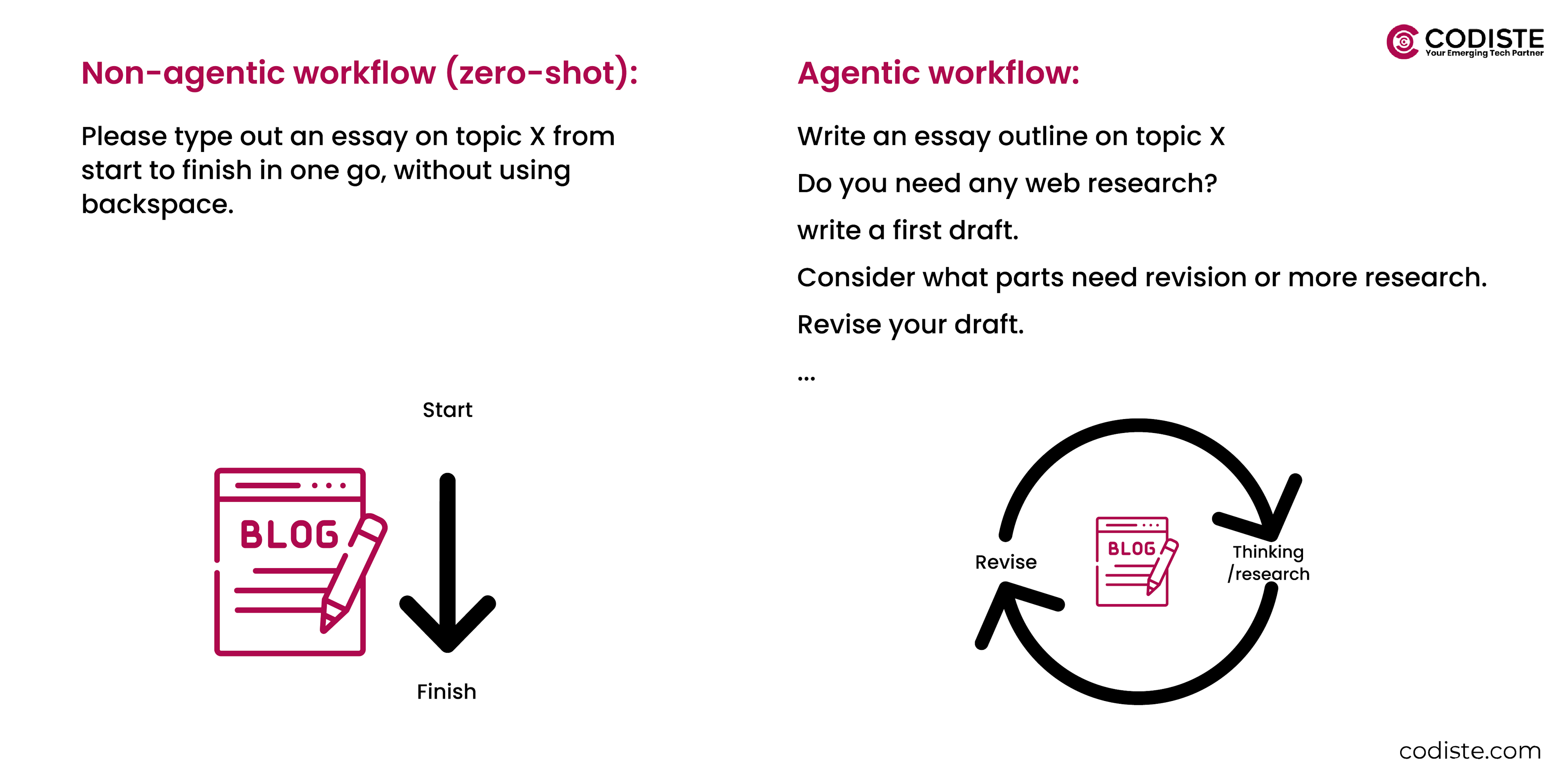
What are AI Agents?
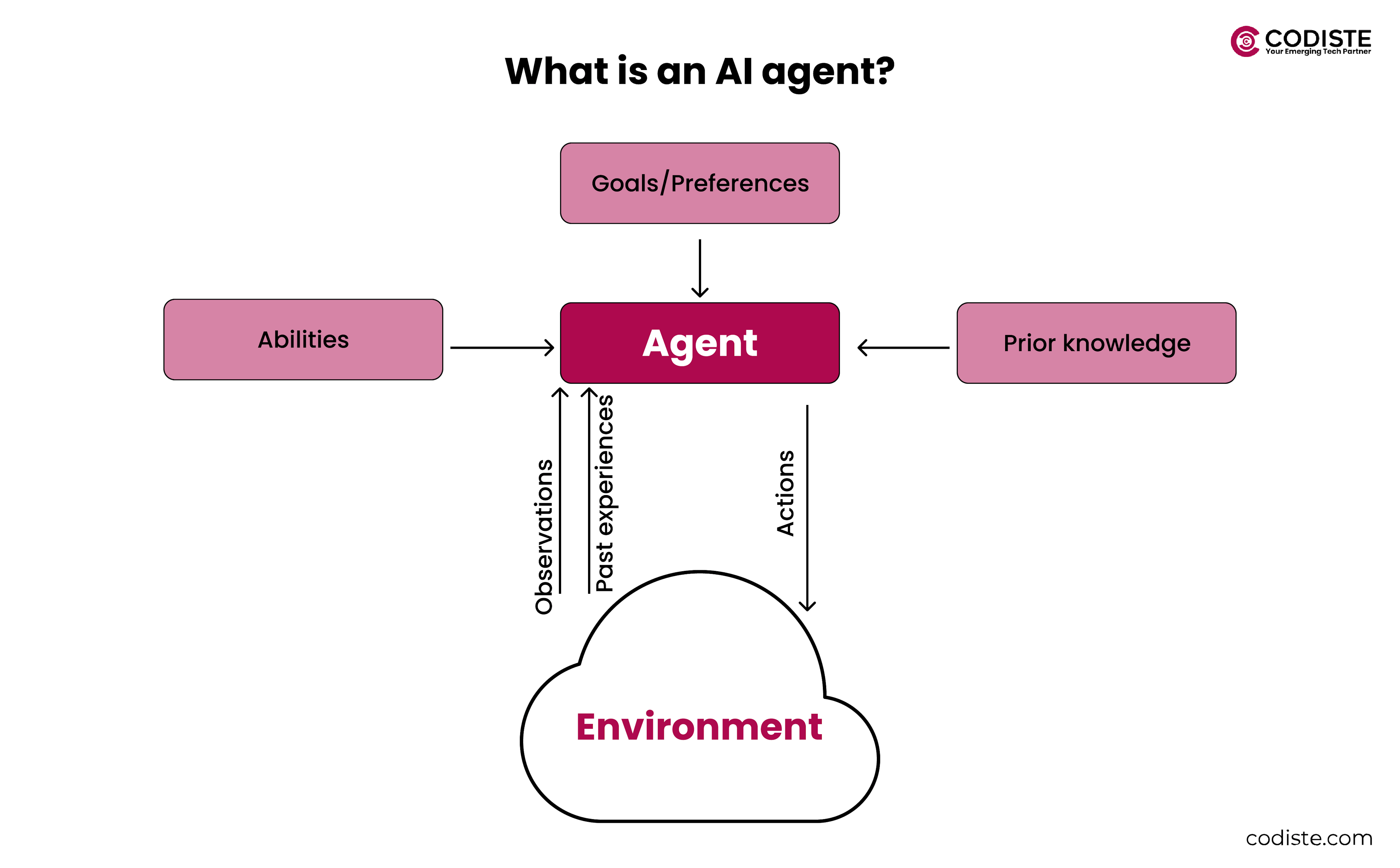
AI (Artificial Intelligence) agent is a software program designed to interact with the real world environment, gather and process the data to perform a self-determined task to accomplish the goals set by humans.
Unlike its predecessors, AI agents have the independence to choose the best action to perform and achieve the goals.
What are Agentic Workflows?
Agentic Workflows are a sophisticated system and iterative process designed to enhance the efficiency and effectiveness of the business process. It uses AI agents to integrate seamlessly with the business settings.
AI agents deployed in Agentic workflows are capable of collaborating and executing complex tasks with high accuracy.
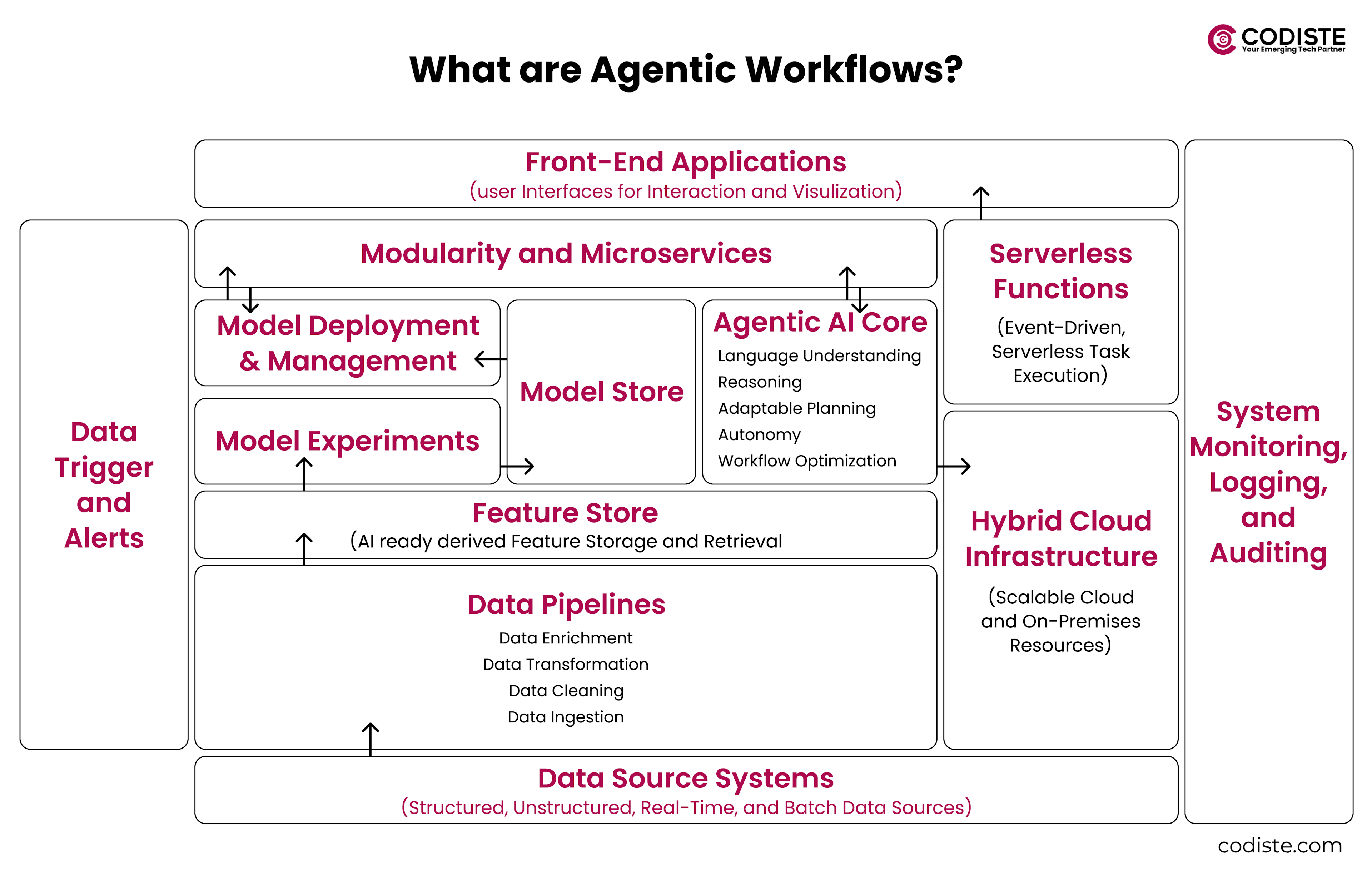
Journey of AI Agents in Business
The world of business witnessed a remarkable milestone in late 2022 with the introduction of ChatGPT, an AI assistant capable of engaging in human-like conversations. This advanced technology demonstrated an extraordinary ability to comprehend user inquiries and provide creative responses. While GPT showcased versatility across various tasks, ranging from poetry composition to coding, it did have some limitations. It faces challenges like occasional inaccuracies and an inability to access real-time data or execute actions.
This led to new developments in the field of AI. Instead of creating general AI models, researchers started focusing on developing specialized AI agents for specific tasks. These AI agents are not just assistants that react to commands, but they are proactive systems that can make decisions on their own, through machine learning (ML) techniques and algorithms that can adapt to new data. These AI agents continuously learn and improve their understanding of various sources of information. These sources include market trends, customer interactions, and supply chain data.
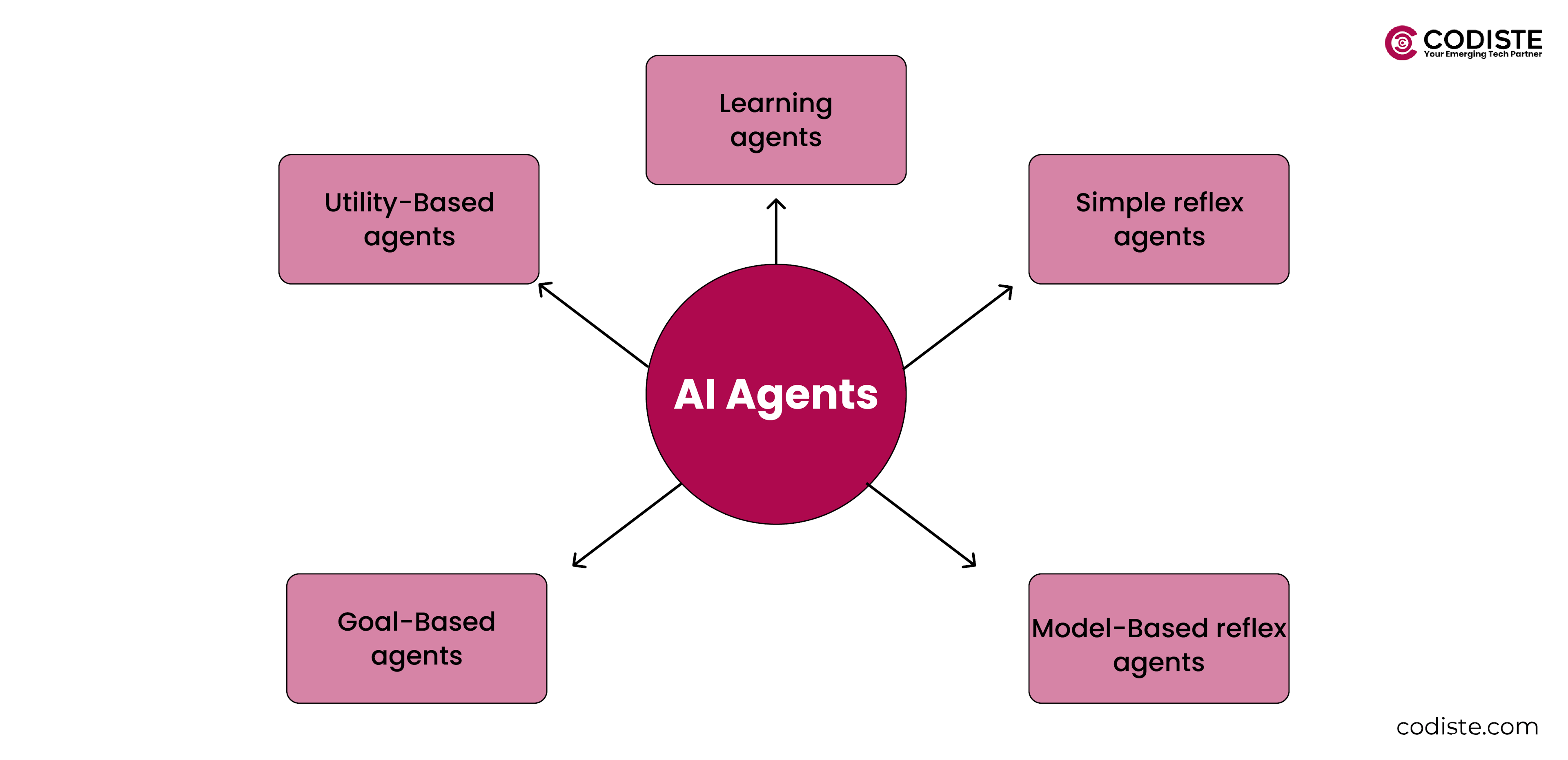
Artificial intelligence (AI) agents are extraordinary because they can think and act independently. For instance, a financial AI agent doesn't merely notify you about changes in the stock market; it actively studies data and market trends to make lightning-fast trading decisions. Similarly, in customer service, AI agents evaluate each situation and decide whether to offer discounts or escalate issues to human representatives. These agents are not rigid or inflexible; instead, they continuously learn and adapt their strategies based on the outcomes of their decisions.
Businesses are seeing a major impact from digital assistants like AI agents. Companies are redesigning their operations around these digital colleagues to incorporate them. AI agents monitor production lines in manufacturing facilities, ensuring everything runs smoothly. In the healthcare sector, they assist doctors and nurses by providing insights for diagnosis and treatment planning. More importantly, these AI agents now play a crucial role in strategic decision-making processes. They analyze complex issues like market expansion or potential acquisitions, offering valuable insights to guide critical business decisions.
What are the Benefits of Agentic Workflows?
Businesses can get more from AI agents by implementing Agentic workflows into business operations. Agentic workflows with automation enhance operational efficiency and contribute significantly to the overall strategic advancement of the business.
Here are all the key impacts created on traditional business processes and operations by agentic workflows.
- Increases work efficiency and productivity
AI agents deployed in agentic workflows handle complex or mundane tasks more accurately than humans through automation. This leads to completing the process much quicker - Adapting to evolving business conditions
Unlike the traditional business process, agentic workflows learn from data patterns and optimize the processes according to the current business conditions. - Enhances decision-making ability
Agentic workflows improve the decision-making ability of the employees by providing critical data insights. In addition, it optimizes the processes through its recommendations and automation. - Reduces operational costs
Automated processes initiated by agentic processes eliminate manual labor which leads to cost reduction. - Improves customer experience
The data insights provided in the Agentic workflows help businesses understand customer behavior and provide more personalized services. This leads to an improved customer experience significantly. - Empower non-technical employees
The advanced automation process offered by agentic workflows boosts the confidence and work efficiency of non-technical employees.
What Are the Core Components of Agentic Workflows?
Agentic workflows use an AI agent which is an autonomously driven dynamic problem solver for handling complex and evolving tasks that lead to improved work efficiency. AI agents, Prompt Engineering Techniques, and Generative AI Networks (GAINs) are the 3 pillars of the agentic workflow process. In addition to those pillars, here are the core components of agentic workflows:
- AI Augmentation
The ultimate goal of agentic workflows is to enhance human capabilities by integrating AI tools and technologies. AI augmentation helps businesses in various ways like easy pattern recognition, faster data analysis, and automation of repetitive tasks. - Ethical Consideration
AI plays a vital role in decision-making and task executions as per ethical considerations. Agentic workflows ensure the system operates within ethical boundaries and by maintaining fairness and accountability according to the organization's values. - Human-AI Interaction
Agentic workflows require interaction between AI-based systems and humans. Human-AI Interactions take place in the form of voice commands, gestures, and other intuitive interfaces in agentic workflows to grasp AI capabilities. - Adaptive Learning
Agentic workflows refine recommendations and predictions to cater ever changing user needs through continuous learning and adaptation. The system manages to learn through user interactions, feedback, and data insights.
Integrating AI Agents into Business Workflows
The agentic workflow’s structure and function in the business setting is to maximize the efficiency and effectiveness of the business operations through integrating AI agents. The structure and function of agentic workflows include
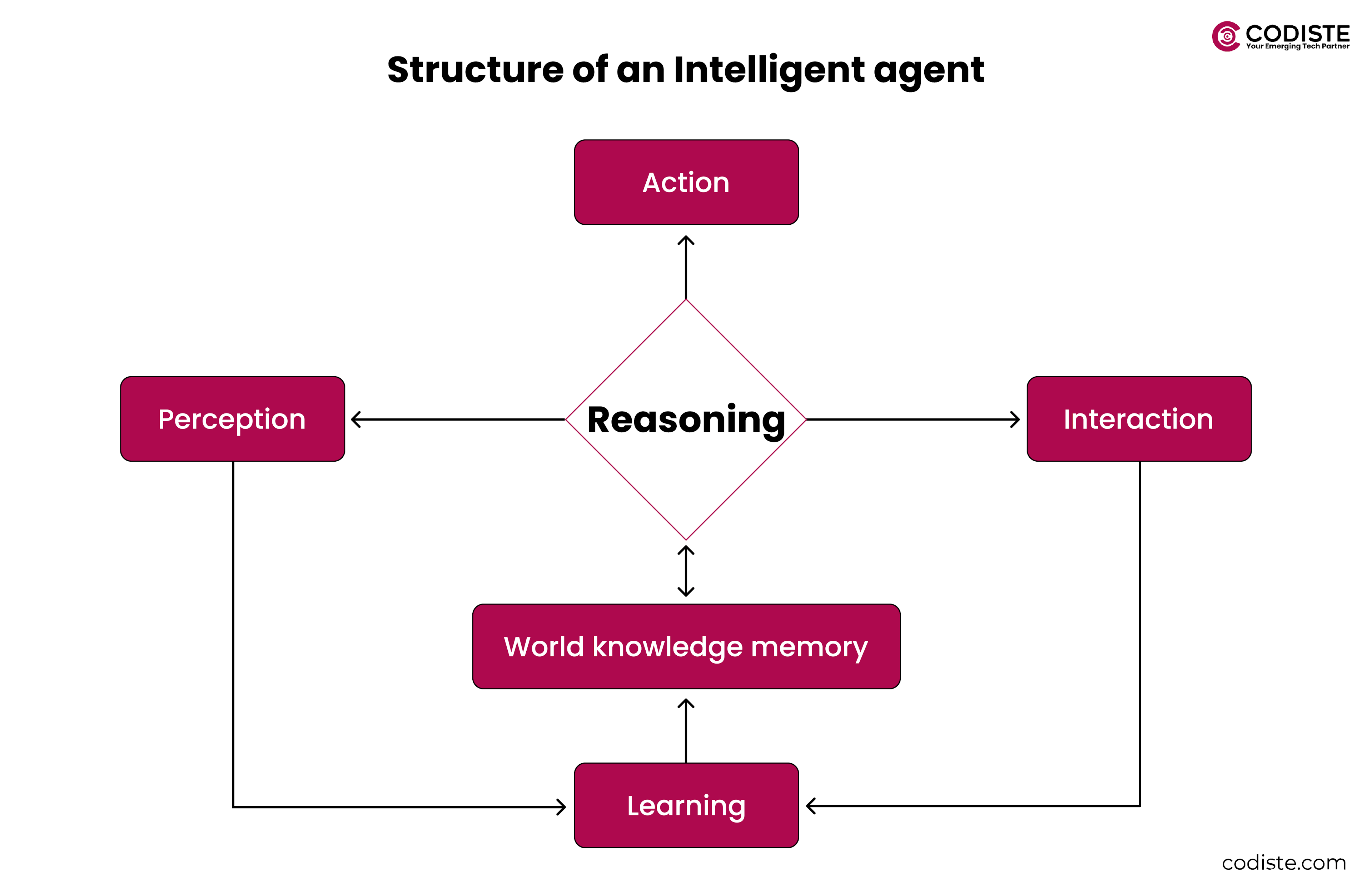
- Data Integrations
The data which are gathered from various sources are processed and analyzed by the AI agents of agentic workflows. This helps the system to make a better insight or inform decision-making for achieving goals in a quick session. - Decision Points
AI agents in the agentic workflows are well-linked and integrated within the workflow. This helps the system to provide analytics-driven insights, through which businesses can eliminate extensive human analysis while making complex business decisions. - Feedback Mechanisms
AI agents in the agentic workflows help systems learn more from the outcomes of the performed actions through feedback mechanisms. This mode of continuous improvement helps businesses adapt to changing market conditions and to improve performance.
Top Use Cases of AI Agentic Workflows in 2025
Agentic workflows have diverse real-world use cases across various sectors. Here are the lists of industries that are benefiting through agentic workflows.
AI Agents in Healthcare
Agentic workflows within this sector are transforming patient care as they authorize AI agents to help doctors make better diagnoses. These agents consider several factors when analyzing the complete medical history of a patient such as genetic history, lifestyle choices, and previous treatments recommend personalized drug plans as per their findings. It means that treatment efficacy will be improved due to its tailored nature while also decreasing risks associated with adverse reactions to drugs. AI agents can be programmed to carry out tasks like scheduling appointments, keeping records, and processing insurance claims automatically.
AI Agents in Customer Support
Agentic workflows are transforming customer service by introducing AI agents that can handle complicated questions thereby relieving human agents from high-pressure environments. These AI agents have been trained using extensive sets of previous interactions which enable them to understand context and identify feelings. If there are complex matters involved, it may give step-by-step answers or smoothly transfer such queries to an expert human being so that the right assistance is always accorded to the client. Furthermore, analyzing the purchase history of a consumer along with their browsing habits and preferences will allow these kinds of representatives to provide highly individualized suggestions about products. This will also enhance satisfaction which leads to loyalty building as well as increased sales retention.
AI Agents in Finance
Within the rapidly changing world of fintech, AI agents operating in agentic workflows have become vital. They continually process huge volumes of real-time data coming from different sources such as stock markets, economic indicators, social media sentiments, etc. This information is then used to produce AI-based insights that aid quick decision-making for traders and analysts. For example, these agents can anticipate market trends by finding connections between apparently unrelated occurrences- for instance, political changes vis-à-vis commodity prices. Additionally, they optimize investment portfolios by factoring in risk appetite, financial objectives as well as prevailing market conditions. The most critical thing about them however lies with their ability to discover abnormal patterns in data which are subtle enough but may indicate fraud or manipulation.
AI Agents in Supply Chain
Supply chains have become more resilient and efficient thanks to agentic workflows. AI agents handle a variety of tasks such as inventory management, route optimization, and demand forecasting. This minimizes human error and operational costs as well. What is even more impressive is that these agents adjust themselves immediately to unexpected changes. For instance, if a supplier is experiencing production delays because of a natural disaster, the AI could quickly recalculate shipping routes, look for other suppliers, or even predict how much this disaster will affect consumer demand. Through machine learning these same agents keep learning from their past mistakes thus each decision they make becomes wiser than before. With such adaptive learning not only do supply chains work well under normal circumstances but they also become strong enough to withstand any unforeseen challenges.
AI Agents in Education
AI agents in agentic workflows are customizing education like never before. For instance, they can build personal lesson plans for a particular student based on the student’s learning style, pace, strengths, and weaknesses. If a visual learner is having trouble with algebra, AI could create interactive graphs or animations; whereas if it was an auditory learner struggling with the same subject, they might get spoken explanations instead. In addition, these virtual teachers can instantly detect gaps in knowledge and suggest appropriate exercises at once. Moreover, outside of pure academia, artificial intelligence also helps schools run more efficiently by taking over routine administrative tasks – think about tasks such as registering courses, grading students’ work, or even identifying those who might drop out.
AI Agents for Project Management
Project Managers are taking advantage of agentic workflows to deal with the complex challenges of their position. AI agents are good at task allocation optimization where they take into account each team member’s skills, current workload, and past performance consistently across the board. Agents also provide real-time updates on progress by flagging any delays or issues with quality instantly. In the management of resources, they anticipate future requirements based on different phases of the project and can even propose cost-cutting measures. However, what’s most fascinating about these agents is that they contribute to the growth of teams. Analyzing the work patterns of each individual in addition to their contributions towards projects, it becomes possible for them to identify areas where skills need improvement and then suggest customized training or mentorship programs.
What are the Benefits of AI Agents in Enterprise Environments?
Integrating AI agents into the enterprise system transforms the traditional business process in numerous ways. Let’s take a look at the key benefits that have a strong impact on an enterprise’s productivity and profitability.
- Enhances Decision-making Capabilities
AI agents provide data-driven insights by analyzing vast amounts of data much faster and more accurately than humans. This provides a clear path for making better decision-making. - Improves Scalability and Adaptability
The ability to handle large volumes of data and to integrate new functionality into business settings brings more scalability and adaptability to businesses in today’s dynamic market. - Cost Reduction
With AI Agents, businesses can reduce significant costs arising from process inefficiency, human errors, and manual processes. In addition, AI agents handle complex tasks more efficiently through automation. - Improves Customer Experience
Integrating AI agents into enterprise systems will encourage customers to engage more with better customer experience by providing prompt and accurate responses to customer queries or conversations.
Implications for the Future of Agentic Workflows
Business landscapes powered by AI are entering a new era, where AI agents can make independent decisions and ease the hassles involved in complex workflows. AI agents and agentic workflows can bring more transformation to how a business operates, operational efficiency, productivity, and overall business values.
Here are some future beckons businesses can gain from agentic workflows and AI agents.
- Competitive Advantage
Agentic AI is a revolution that will help businesses bring new levels of efficiency and focus on deeper data-driven insights to gain significant competitive advantage. - Prioritize Customization
Custom-tailored agentic workflows and AI agents will create a significant impact on businesses that rely on specific industries or data. - Prioritize Ethical Considerations
The development and deployment of agentic AI based on clear governance frameworks and ethical considerations will build trust and allow businesses to foster long-term success.
Conclusion
Ever-evolving sphere of Artificial Intelligence propels businesses towards the age of automation. Understanding the capability of Agentic AI, businesses should implement AI agents strategically, and prioritizing responsible practices will result in substantial benefits.
However, to gain more from Agentic AI, you need AI developers with solid programming and API knowledge. Codiste is a reliable AI development company in the USA with expertise in implementing software programs designed to interact with the real world environment. AI experts at Codiste have expertise in delivering AI-powered quality and innovation using their years of experience. Thinking of running GPT-5/Claude 4/Gemini 2.0 (zero-shot) on your app? Willing to enjoy similar result performance with agentic reasoning? Contact us now!


